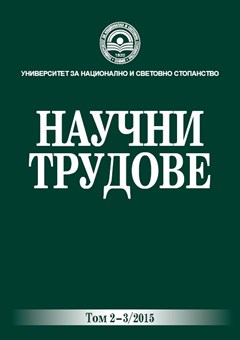Икономически функции на съвременното българско семейство
Economic Functions of Contemporary Bulgarian Family
Author(s): Mihail Stoyanov MirchevSubject(s): Social Sciences, Economy, Sociology, Social development, Family and social welfare, Human Resources in Economy, Socio-Economic Research
Published by: Университет за национално и световно стопанство (УНСС)
Keywords: family economic functions; non-economic factor; productive work; career; material standart; family budget; consumer activity; human capital; empirical research; empirical indicators; comparative analy
Summary/Abstract: The paper presents theoretical and methodological frame, research tools and main results of the research project carried out in 2009-2012, funded by UNWE. I have been working in this research field since 2004-2009 in the ASSA-M demographic and sociological research project on: „Family and marriage. Fertility and reproduction of population. Demographic situation and perspectives“. In 2014, ASSA-M Agency continued to monitor the development of the processes and tendencies in the field by representative surveys. The family is seen not only as an object of economic and market entrepreneurship. But as a direct economic entity – a comparable resource for entrepreneurship, investment and economic activity. The family also has indirect economic functions, as far as it is a fundamental „non-economic“ factor for economic modernization, civil framework and incentive or an obstacle for modernization. The paper analyses both direct and indirect economic functions of contemporary Bulgarian family. The family is positioned in the system of factors of economic and social modernization of Bulgaria. The family as a „non-economic factor“ is analyzed in 6 thematic fields: (1) direct economic functions: business property tax credit obligations; (2) preparation for work, motivated and productive work; (3) professional development, career stability; (4) solvency and material standard; (5) consumer activity; (6) human capital, social (dis)integration. Here I venture to emphasize three research achievements: (1) business and economic functions (direct and indirect) of the modern family are defined in system scope; (2) some basic blocks of empirical indicators on key areas of implementation of the modern family as a direct business-economic entity, together with its role as a major „non-economic“ factor for modernization of the Bulgarian economy are operationalized (original questionnaire); (3) a methodology for comparative data analysis has been elaborated.
Journal: Научни трудове на УНСС
- Issue Year: 3/2015
- Issue No: 3
- Page Range: 121-212
- Page Count: 92
- Language: Bulgarian

